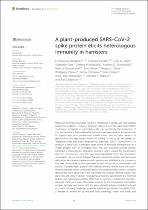A plant-produced SARS-CoV-2 spike protein elicits heterologous immunity in hamsters
| dc.contributor.author | Margolin, Emmanuel | |
| dc.contributor.author | Schäfer, Georgia | |
| dc.contributor.author | Shaw, Megan L. | |
| dc.date.accessioned | 2023-04-21T09:36:13Z | |
| dc.date.available | 2023-04-21T09:36:13Z | |
| dc.date.issued | 2023 | |
| dc.identifier.citation | Margolin, E. et al. (2023). A plant-produced SARS-CoV-2 spike protein elicits heterologous immunity in hamsters. Frontiers in Plant Science, 14, 1146234. https://doi.org/10.3389/fpls.2023.1146234 | en_US |
| dc.identifier.issn | 1664-462X | |
| dc.identifier.uri | https://doi.org/10.3389/fpls.2023.1146234 | |
| dc.identifier.uri | http://hdl.handle.net/10566/8855 | |
| dc.description.abstract | Molecular farming of vaccines has been heralded as a cheap, safe and scalable production platform. In reality, however, differences in the plant biosynthetic machinery, compared to mammalian cells, can complicate the production of viral glycoproteins. Remodelling the secretory pathway presents an opportunity to support key post-translational modifications, and to tailor aspects of glycosylation and glycosylation-directed folding. In this study, we applied an integrated host and glyco-engineering approach, NXS/T Generation™, to produce a SARS-CoV-2 prefusion spike trimer in Nicotiana benthamiana as a model antigen from an emerging virus. The size exclusion-purified protein exhibited a characteristic prefusion structure when viewed by transmission electron microscopy, and this was indistinguishable from the equivalent mammalian cell-produced antigen. | en_US |
| dc.language.iso | en | en_US |
| dc.publisher | Frontiers Media | en_US |
| dc.subject | Glycoprotein | en_US |
| dc.subject | Glycosylation | en_US |
| dc.subject | Vaccine | en_US |
| dc.subject | Bioscience | en_US |
| dc.subject | Medicine | en_US |
| dc.title | A plant-produced SARS-CoV-2 spike protein elicits heterologous immunity in hamsters | en_US |
| dc.type | Article | en_US |

